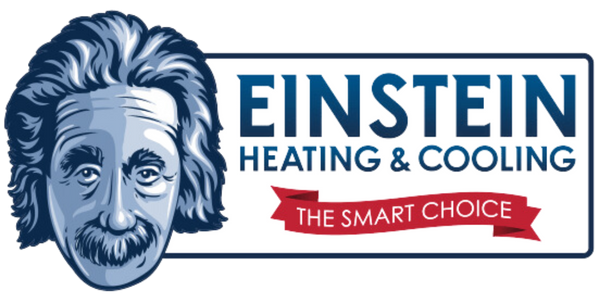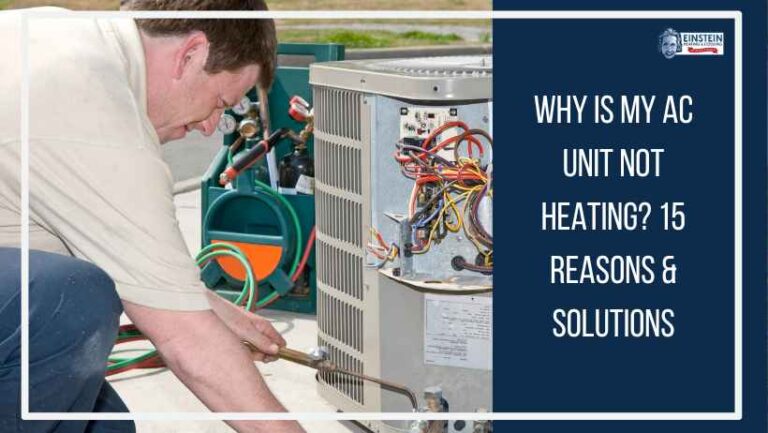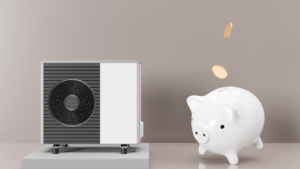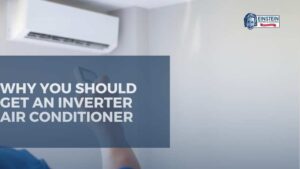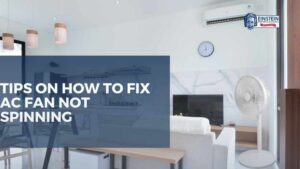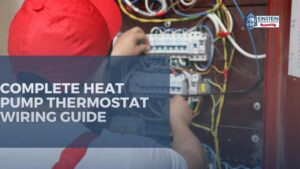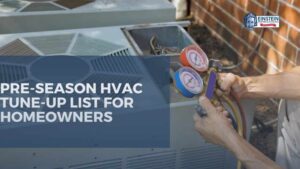A malfunctioning AC unit that fails to produce heat can be a frustrating experience, especially during colder months when warmth is essential. In this article, we will explore 15 common factors to solve the question of “why is my AC unit not heating?” and provide practical solutions to address each one. But first, let’s discuss how an AC unit works.
How does an AC unit provide heating?
Understanding how an AC unit works is essential for you to find relevant solutions in fixing heating and cooling issues. An air conditioning (AC) unit providing heating, typically in the context of a heat pump system, operates on the principle of heat transfer. Unlike traditional heating systems that generate heat, AC units with a heating function use a reversible refrigeration cycle to move heat from one location to another.
1. Refrigeration Cycle:
- Evaporation (Indoor Coil): The process begins inside your home, where a refrigerant, typically a special type of fluid, circulates through the indoor coil. In heating mode, the refrigerant absorbs heat from the indoor air, evaporating into a low-pressure, low-temperature gas.
- Compression (Compressor): The refrigerant gas then moves to the compressor, where it undergoes compression. This process increases both its pressure and temperature, transforming it into a high-pressure, high-temperature gas.
- Condensation (Outdoor Coil): The high-pressure, high-temperature gas is pumped to the outdoor coil, where it releases heat to the surrounding air and condenses back into a liquid state.
- Expansion (Expansion Valve): The liquid refrigerant returns to the indoor coil through an expansion valve, reducing its pressure and temperature, and the cycle repeats.
2. Reversing Valve:
The key to the AC unit’s heating function is the reversing valve. This component allows the refrigerant to change direction, reversing the flow of the refrigeration cycle. During the heating mode, the reversing valve directs the hot refrigerant to the indoor coil, where it releases the absorbed heat into the indoor air.
3. Distribution of Heated Air:
Once the refrigerant releases heat indoors, the blower fan circulates the now-heated air through the ductwork and into the living spaces. This warmed air provides a comfortable and controlled indoor temperature, effectively serving as a heating mechanism.
4. Supplementary Heating (Electric Resistance):
In some AC units, especially in regions with extremely low temperatures, there might be a supplementary heating element, often electric resistance heating. This element is activated when additional heating is required, ensuring the system can meet the heating demands even in colder conditions.
5. Energy Efficiency:
While traditional heating systems generate heat, AC units that provide heating are often more energy-efficient because they don’t create heat but rather transfer it. By utilizing the heat exchange process, these units can provide both heating and cooling functions, making them versatile and energy-conscious solutions for maintaining indoor comfort throughout the year.
The ability to both cool and heat makes these systems efficient and adaptable for year-round climate control. However, when AC units malfunction, it’s important to check all parts and read through all the factors listed below before calling a professional.
Top 15 Reasons and Solutions for AC unit not heating
1. Thermostat Settings
Incorrect Temperature Settings
One of the most common reasons for an AC unit not heating is incorrect thermostat settings. Ensure that your thermostat is set to the heating mode and that the temperature is higher than the current room temperature. This simple oversight can lead to your AC unit blowing cold air instead of providing warmth.
Dead Batteries in Thermostat
Dead or low batteries in the thermostat can disrupt communication with your heating system. If your thermostat screen is blank or not displaying the correct information, replace the batteries. Regularly checking and changing the batteries is a simple yet effective way to avoid this issue.
2. Air Filter Issues
Clogged Air Filters
Clogged air filters can significantly impede the airflow in your heating system. Over time, dust and debris accumulate in the filters, reducing their efficiency. Regularly clean or replace air filters to ensure proper airflow and prevent blockages that hinder the heating process.
3. Pilot Light or Ignition Problems
Pilot Light Outage (Gas Furnace)
In gas-powered heating systems, a pilot light provides the flame needed for heat generation. If the pilot light is out, your furnace won’t produce heat. Consult your furnace’s manual for instructions on relighting the pilot light to restore the heating function.
Ignition System Malfunction
Modern furnaces use electronic ignition systems, and if this system fails, the furnace won’t produce heat. Troubleshoot the ignition system according to the manufacturer’s guidelines or seek professional help to ensure proper functioning.
4. Lack of Maintenance
Infrequent System Maintenance
Regular AC maintenance is crucial for the optimal performance of your AC unit. Over time, components can wear out or become dirty, affecting the system’s efficiency. Schedule professional inspections and maintenance to identify and address potential issues before they escalate.
5. Ductwork Issues
Leaks or Blockages in Ductwork
Leaky or blocked ductwork can hinder the distribution of heated air throughout your home. Inspect your ducts for visible issues and hire a professional to seal leaks or clear blockages, ensuring the efficient flow of warm air.
6. Refrigerant Levels
Low Refrigerant Levels
In heat pump systems, low refrigerant levels can hinder the heating process. A certified technician should inspect the system for leaks, repair any found issues, and recharge it with the appropriate refrigerant to restore proper functionality.
7. Electrical Problems
Faulty Wiring
Damaged or faulty electrical wiring can disrupt the proper functioning of the heating system. If you notice issues with your AC unit not heating, hire a qualified technician to inspect and repair any problems with the wiring to ensure safety and efficient operation.
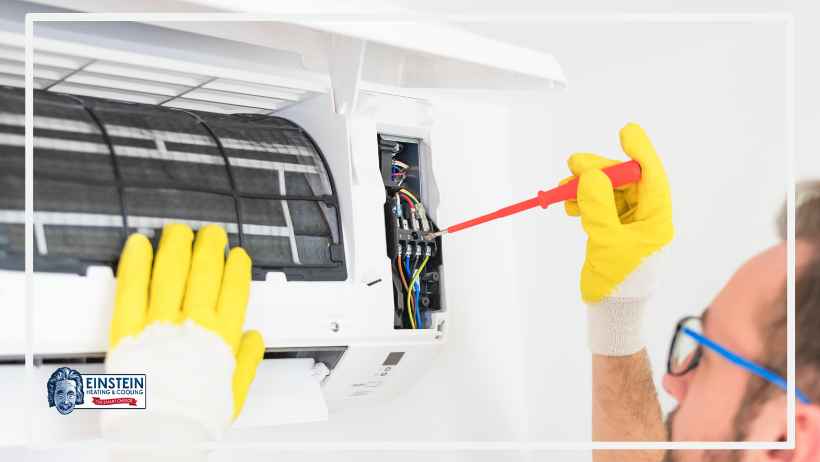
8. Malfunctioning Thermostat Sensor
Sensor Calibration Issues
A malfunctioning thermostat sensor can lead to inaccurate temperature readings, affecting the heating performance. Recalibrate or replace the thermostat sensor to ensure accurate temperature control and prevent your AC unit from blowing cold air. In the event of a sudden HVAC malfunction, make sure to ready your list of emergency HVAC solutions especially in the colder months.
9. Heat Exchanger Problems
Cracked Heat Exchanger
A cracked heat exchanger can pose serious safety concerns in gas furnaces. If you suspect a cracked heat exchanger, immediately turn off the furnace and seek professional assistance. This issue requires prompt attention to prevent potential health hazards.
10. Blocked Vents or Registers
Obstructed Air Vents or Registers
Blocked vents or registers can impede the flow of heated air into your living spaces. Ensure that vents and registers are free from obstructions such as furniture or curtains, allowing unrestricted airflow and optimizing the heating distribution throughout your home.
11. Blower Motor Issues
Malfunctioning Blower Motor
A malfunctioning blower motor can hinder the distribution of heated air. If you notice weak airflow or unusual noises, the blower motor may be the culprit. Consult an HVAC professional to inspect and repair or replace the blower motor as needed.
12. Thermostat Location
Improper Thermostat Placement
The location of your thermostat matters. If it’s exposed to direct sunlight, drafts, or other temperature-altering factors, it may not accurately gauge the room temperature. Relocate the thermostat to a more stable environment for precise temperature control.
13. System Capacity
Undersized Heating System
If your heating system is undersized for your space, it might struggle to meet the heating demands. Consult with a professional to determine the appropriate heating capacity for your home and consider upgrading your system if necessary.
14. External Obstructions
Outdoor Unit Obstructions
For heat pump systems, the outdoor unit needs proper airflow. Ensure there are no obstructions like debris, plants, or snow around the outdoor unit, as these can impede heat exchange and affect the system’s heating efficiency.
15. Faulty Temperature Control Board
Temperature Control Board Malfunction
The temperature control board regulates the heating process. Your AC unit heater not working could show up as a sign of it not responding to temperature changes. A technician can diagnose and repair or replace the temperature control board as needed.
Why choose Einstein Heating and Cooling?
Choosing Einstein Heating and Cooling for your AC unit repair and maintenance in Bend, Oregon ensures a seamless and reliable experience that prioritizes customer satisfaction.
Our professionals are well-versed in diagnosing and resolving a wide range of AC issues, from thermostat malfunctions to complex refrigeration system problems. We pride ourselves on transparency, providing clear explanations of the repair process and offering fair, competitive pricing.
Our dedication to exceptional service, technical proficiency, and customer-focused approach make Einstein Heating and Cooling the go-to choice for those seeking trustworthy and efficient solutions for their AC unit repair and maintenance needs.
Conclusion
Identifying and addressing the reasons why your AC unit is not heating is crucial for maintaining a comfortable indoor environment. Regular maintenance, attention to thermostat settings, and addressing specific issues with components such as the pilot light or heat exchanger can help ensure the efficient operation of your heating system. If troubleshooting these issues on your own proves challenging, seeking professional assistance from Einstein Heating and Cooling is always a wise choice to prevent further damage and ensure the longevity of your HVAC system.
